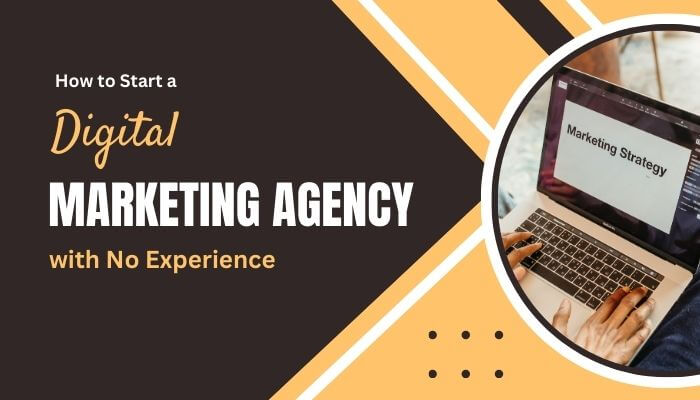Introduction
Running a digital marketing agency is one of the most profitable business models in the digital age. But what if you have zero experience? Is it still possible to make it into the industry and start a successful agency? The answer is yes! Many of the men and women now operating successful digital marketing agencies came into the industry with zero experience.
Digital marketing is an ever-changing field and you will be judged by how well you learn, adapt, and implement best practices. This article will guide you in the exact procedure to start a digital marketing agency even if you are a complete beginner. You will leave with a roadmap for learning the fundamentals to building your business as you scale.
Also Read: Social Media Marketing for Doctors: What You Need to Know
Understanding the Basics of Digital Marketing
Before we learn how to start your digital marketing agency, it is important to know about digital marketing. It is a wide category which deals with the promotion of products and services through the digital mediums like social media, search engines, websites, and email.
Core Areas of Digital Marketing Include:
- Search Engine Optimization (SEO)
Search engine optimization (SEO) is the strategy of optimizing your website so that it shows up on the search engines such as Google. It is supposed to provide organic traffic by making your website appears when people search for relevant keywords. SEO is so important because it’s the base on which most digital marketing strategies. - Social Media Marketing
Social media marketing like Facebook, Instagram, LinkedIn, and Twitter is very important for brand recognition. An effective social media strategy involves sharing content, advertising, and engaging your audience. - Content Marketing
Content marketing focuses on creating valuable, informative content that resonates with your audience. These might include blog posts, videos, infographics, or even podcasts. Content is the master of digital marketing as it helps establish trust and generate traffic. - Pay-Per-Click (PPC) Advertising
PPC involves paying for ads on platforms like Google or social media. You only pay when someone clicks on your Ad. This method is beneficial for driving targeted traffic to websites. - Email Marketing
Email marketing is essentially the practice of emailing your audience to make them active users who will become long-term customers. Email marketing can be a good revenue-creating tool when used with the right strategy
Skills You Need to Start a Digital Marketing Agency

Running a successful digital marketing agency requires a diverse skill set. Luckily, these skills can be acquired online, often for free, through courses and hands-on experience. Here are some of the essential skills you need to develop:
- SEO and Analytics
SEO is the cornerstone of any digital marketing strategy. You must know how the search engines operate and how to get content ranking higher. You will get your website’s performance, traffic, and user analytics from tools such as Google Analytics. - Content Creation and Copywriting
Content plays a vital role in keeping your readers engaged. If you are a digital marketing agency owner, you should be able to craft some compelling content that resonates with your customers. This includes writing blogs, producing videos, or designing social media graphics. - Social Media Management
Managing multiple social media platforms requires you to know algorithms, build an audience, and creating shareable content. Familiarize yourself with tools, such as Hootsuite or Buffer, to schedule posts and check analytics. - PPC Advertising
PPC campaigns can be conducted with the assistance of Google Ads and Facebook Ads. You’ll have to understand how to bidding strategies, what keywords to target, and how to write ad copywriting to create a profitable campaign. - Email Marketing and Automation
Understand how to segment your email lists and customize campaigns to drive conversions. Email marketing can be automated using tools such as Mailchimp or Constant Contact.
How to Gain Experience with No Formal Background
You don’t need to have years of experience working at an agency to start your own. Here are practical ways to build your skills and portfolio:
- Freelancing
It can begin with small projects like freelancers. There are platforms like Upwork, Fiverr, and Freelancer where you can accept small projects and start to accumulate clients. Focus on projects that is relevant to your expertise and you will get plenty of experience to attract larger clients. - Internships and Volunteering
You can also get practical experience by interning in a digital marketing agency or volunteering with your local business. Many small companies want support but cannot afford full-time marketers. When you can provide your services for free or for a discount, it gives you a portfolio and gather testimonials. - Personal Projects
Design your own projects like a blog, YouTube channel, or e-commerce store. This is practical learning where you can play around with various techniques and understand how to focus your efforts. If you want to write about digital marketing, for instance, starting a digital marketing blog will let you know SEO, content creation, and social media marketing. - Offer Free Services
Reach out to small businesses around you or through your network and help them with digital marketing for free or at an extremely reduced price. It’s the best way to create a portfolio and gather case studies and testimonials to use when pitching to paying clients.
Choosing a Niche for Your Digital Marketing Agency
This is an important decision for every digital marketing agency when it comes to selecting a niche. If you have an industry in mind, you can personalize your services for specific customers. Niching down is where you can make yourself an expert in that industry and be a competitive edge.
Benefits of Choosing a Niche:
- Specialization: Specializing in one area (e.g., healthcare, e-commerce, real estate) means you will better understand the specific needs, trends, and pain points of businesses in that niche.
- Client Trust: Clients are more likely to trust an agency that has a proven track record in their specific field.
- Efficient Strategies: You can reuse strategies, content, and insights across different clients within the same niche, which saves time and improves results.
For example, you might choose to focus on digital marketing for local businesses or SEO for real estate agents. Once you have chosen your niche, create content and case studies that appeal to your target audience within that industry.
Building Your Digital Marketing Services Online Presence
When you have a digital marketing agency, your online presence is your business card. It shows your professionalism, your credibility, and your success. Here is how to build a great online presence:
- Create a Professional Website
Your website is the face of your agency. It should include the following:- Services: Clearly outline the services you offer (SEO, social media, PPC, etc.).
- Portfolio: Showcase case studies, testimonials, and any previous work you’ve done.
- About Us: Share your story, your team (if you have one), and your mission.
- Blog: Regularly publish content to demonstrate your expertise in digital marketing. SEO-optimized blog posts will help attract organic traffic to your site.
- Set Up Social Media Profiles
Create business profiles on platforms like LinkedIn, Instagram, Twitter, and Facebook. Use these platforms to share insights, case studies, and client testimonials. Social media is also an excellent place to connect with potential clients. - Create Content Regularly
Content marketing is crucial for positioning your digital marketing agency as a thought leader in the industry. Publish regular blog posts, video tutorials, webinars, and case studies. Share tips, insights, and industry trends to build your authority and trust.
Also Read: How To Turn Your Hobby Into A Business
Tools You Need to Run a Digital Marketing Agency
Managing a digital marketing agency means having various tools to manage your processes, monitor outcomes, and deliver better results for your customers. Here are some essential tools you need to get started:
- Google Analytics
This free tool provides insights into website traffic, user behavior, and more. Use it to track the performance of your marketing campaigns. - SEMrush
SEMrush is a comprehensive SEO tool that helps with keyword research, competitor analysis, and tracking your website’s SEO performance. While there is a paid version, beginners can start with the free version to explore its features. - Hootsuite
Hootsuite is a social media management tool that allows you to schedule posts, track engagement, and manage multiple social media accounts from one dashboard. - Mailchimp
Mailchimp is one of the best tools for email marketing. It allows you to create email campaigns, manage lists, and track performance. - Canva
Canva is a design tool that makes it easy to create stunning graphics for social media, email campaigns, and blog posts without needing a design background.
By leveraging these tools, you will be able to efficiently manage marketing campaigns and measure your results.
How to Find Clients for Your Digital Marketing Agency
Finding clients for your digital marketing agency can be challenging, especially in the beginning. Here are a few strategies to help you land your first clients:
- Networking
Attend local business shows, trade shows and live webinars. Networking is your number one method to connect with potential customers and establish contacts. Hand out business cards and always be prepared to explain your agency does. - Leverage Social Media
Connect with companies via platforms like LinkedIn and Facebook. Join groups and engage in conversation to market yourself and attract potential clients. Provide relevant content & resources to help companies with their marketing issues.
- Cold Outreach
Research clients in your industry and write specific emails sharing about your agency and your products and services offer. Explain your expertise to solve their specific problems. Keep your emails short and to the point. The right outreach message will bring people in for a conversation. - Referrals
Encourage your existing customers (and even if they are small initially) to refer you to other companies. You can reward them with a little incentive such as a discount on future work to encourage them to promote your agency. - Freelance Platforms
Find clients looking for digital marketing services using sites such as Upwork and Fiverr. Such platforms help you to create your portfolio and testimonials very easily. You will receive more clients and charge more as you get more good reviews. - Content Marketing
If you write some useful content about your niche, you will get organic traffic to your website. It can be blogs, eBooks, or tutorials. By way of example, if you were to publish an e-book on “10 Digital Marketing Strategies for Local Businesses”, it would be the right choice for local business owners to use your services.
Pricing Your Services
Pricing strategy is one of the most important factors that will determine the success of your digital marketing agency. Prices that are too high can turn away potential clients and low prices can discount your services. You can think of pricing models as follows:
- Hourly Rate
Charging clients by the hour is common, especially for freelance work. Find your hourly rate according to your expertise and the current market rate. You can do less as an absolute beginner but gradually increase it over time based on experience and feedback. - Project-Based Pricing
You can charge a fixed price for certain projects. It helps the client understand the price tag, and helps them budget accordingly. You need to make sure that you specify the scope of work so you do not get stuck in scope creep. - Retainer Model
Digital marketing agencies often have retainer contracts, where clients pay a monthly fee for a package of services. This model gives a predictable revenue and long-term client relationships. - Performance-Based Pricing
It is a model in which you charge according to the outcomes you provide, such as a percentage of additional sales or leads generated. This can be very lucrative, but it involves the careful monitoring of performance metrics. - Package Pricing
Build service packages incorporating several offerings. You may, for instance, provide a “Startup Package” of website design, SEO, and social media management at one discounted price. This can be a more efficient and effective way for clients to know what they are getting and enhance perceived value.
Building a Team
As your digital marketing agency grows, you may find yourself overwhelmed with work. At this point, building a team can help you scale your operations. Here are steps to consider:
- Identifying Roles
Determine what roles you require, depending on your agency’s capabilities. This might be SEO professionals, social media managers, content authors, and designers. Focus on recruiting people with your skills matched up. - Freelancers vs. Full-Time Employees
Determine whether you want freelancers or permanent employees. Freelancers can be flexible and cost less, but full-time employees can offer more dedication and consistency. - Remote Work
Consider building a remote team. With tools like Slack, Trello, and Zoom, managing a remote team is more accessible than ever. You can tap into a broader talent pool, regardless of location. - Outsourcing
When you have more detailed work (graphic design, content creation) outsource it to specialized agencies or freelancers. This will help you deliver high-quality results without having full-time employees. - Creating a Positive Work Culture
As you build your team, prioritize creating a positive and collaborative work environment. Encourage open communication, provide opportunities for professional development, and celebrate team achievements.
Scaling Your Digital Marketing Agency
Once you have established a client base and gained experience, it’s time to think about scaling your digital marketing agency. Here are strategies to grow your business further:
- Diversifying Your Services
As you become more comfortable, consider expanding your service offerings. If you initially focused on social media marketing, you might add SEO, content marketing, or email marketing to your portfolio. - Creating a Referral Program
Encourage satisfied clients to refer new business by creating a referral program. Offer incentives such as discounts or freebies for every new client they bring in. - Investing in Advertising
Use paid advertising to promote your agency. This could include running PPC campaigns on Google or social media platforms. Ensure your ads target your ideal clients to maximize effectiveness. - Networking and Partnerships
Participate in industry events, network with local businesses, and get to know other agencies for potential partnerships. Networking can result in two-way partnership opportunities, such as cross-referrals or bundled services. - Gathering Testimonials and Case Studies
When you can achieve positive results for your clients, collect testimonials and case studies to demonstrate your accomplishments. You can include social proof on your website to establish trust with the prospect and boost conversions. - Monitoring Industry Trends
The digital marketing environment is constantly changing. Know about the industry trends, new tools, and best practices. Join industry blogs, attend webinars, join forums, and make sure you are staying ahead of the game.
Conclusion
It is completely possible to start your digital marketing agency without any experience if you know how and give it your best effort. If you understand digital marketing basics, learn the necessary skills, and develop your digital brand, you can build an agency from scratch.
As you expand, focus on delivering exceptional customer service, having a great team, and continuously evolving your offerings. As you know, everyone who is an expert is a beginner and you are at the beginning of your digital marketing journey. Accept the challenge, continue to learn, and you will be well on your way to running a successful digital marketing agency.




